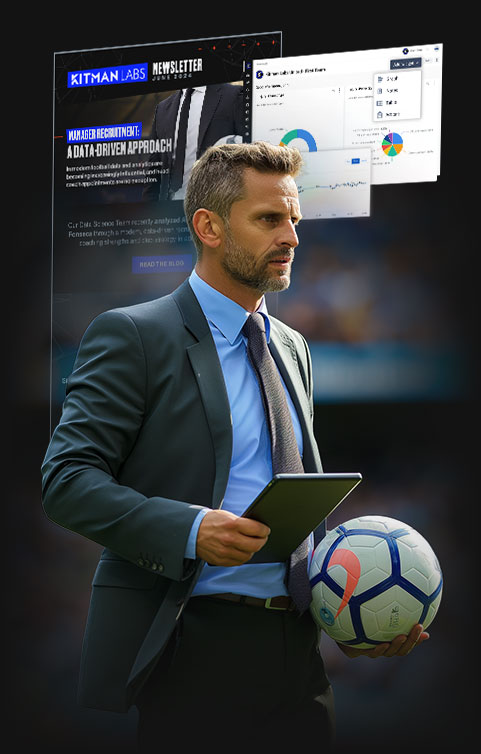Legendary Performance Coach Mike Boyle recently joined CEO and Founder of Kitman Labs, Stephen Smith on the Game Changer Podcast.
Mike has been involved in elite sport for close to 40 years, and worked with some of the greatest athletes in the biggest sporting teams, including the likes of the Boston Bruins, the USA Hockey National Team Development and the Boston Red Sox during their 2013 World Series win. During this interview Mike revealed some of his personal philosophies and the greatest lessons he’s learnt during his successful career.
1.DON’T BE AFRAID TO CHALLENGE WHAT YOU DON’T UNDERSTAND – AND GET COMFORTABLE DOING IT
Sometimes being a good teammate means being willing to participate in some healthy conflict. I did that with the idea that we need to change paradigms, we need to change the way people think. We can’t do that if we don’t have some healthy conflict.
If someone doesn’t step up and say, “Wait a second. Why are we doing that, or why aren’t we doing this?” then, you’d never have that dialogue and everybody maintains their silo.
If you don’t go over and bang on the door, and say, “What the hell do you guys do in there? Why do you do it that way?” Then, things don’t really get done.
2.THE MORE YOU LEARN, THE LESS YOU REALISE YOU KNOW
As you get older, you tend to get less certain and more sceptical. Even after 38 years of experience in the sports industry, to this day I still have epiphanies and moments where I think,“Wow, I was wrong about that. I can’t believe how wrong I was and I can’t believe how long I thought that I was right.”
Still I always tell people I’m right, right up until the moment I think I’m wrong. I think that’s what bothers people, that I just change my mind. My response to them is to just say”That’s what learning is.”
3.ACKNOWLEDGE WHEN PEOPLE ARE SMARTER THAN YOU
When you’re in the presence of someone who’s smarter than you, you need to acknowledge that you’re in the presence of someone that’s smarter than you.
You need to take it in, and to figure out how you can use what this person is telling me to help me. Whether that was the time I listened to Stuart McGill or talking with Mark Verstegen, or any of these moments that I’ve had where I’ve been with someone and thought, “Hey, this person, they’re right. What they’re doing is better than what I’m doing. I’m going to incorporate what they’re doing into what I’m doing. I’m going to make it part of my system.”
My system is like a chop shop for cars, where you swap parts in and out that you stole from somebody else.
In my mind, my system, is a conglomeration of the best thinkers in the industry for the last 40 years, and really, maybe longer when I think about some of the stuff I’ve read that was written more than 40 years ago.
I feel like if you’re not doing this, you’re doing a massive disservice to whatever your audience is, whatever your group is, whatever your team is.
4.LEARN HOW TO FILTER OUT THE GOOD AND THE BAD
One of my orthopaedic surgeon friends was once involved in a project, where did all these experimental surgeries and they all failed.
He said to me, “The lesson I learned was that I shouldn’t be the first guy to do a new technique, and I shouldn’t be the last guy to do a new technique.” I thought that was a really good lesson for me as it applies to just about everything, in the sense that you don’t always want to be the first guy running to everything that’s new and you don’t want to be the last guy who eventually gets to everything that’s new.
I’ve always been a bit of an early adopter as long as I don’t think anyone’s going to get hurt. But I think you also have to be an early abandoner if you start looking at something and thinking, “Hey, I don’t really think this works.” It’s that ability.
I always say we need to become our own filter and use the example of a garden screen. If you had dirt in your garden and you wanted to screen out the rocks, what you usually do is put it through a garden screen — you throw dirt on it and you shake it, and the rocks get caught in it and the dirt goes through.
We’ve got to be able to do that ourselves in terms of figuring out, “Okay, what’s just dirt that’s going to fall through and what are the big rocks that I want to catch here as they go through?” Really developing that ability to be a screen yourself is probably the central skill to being successful.
5.BELIEVE IN WHAT YOU’RE DOING – OR GET OUT
We’re trying to improve performance, we’re trying to prevent injury. You’ve got to be able to look at things and think, “Did performance improve? Did injury rates go down?“
Neither of those things are all that difficult to measure. Whether statistically, in terms of playing the game or in terms of the number of game appearances. What I don’t like is when people start saying, “Well, we don’t influence wins and losses. Things just happen.”
Statistically, things don’t happen in the sense that, yes, you might have a guy who tears his ACL, you might have your best player get hurt. But statistically speaking, over time, if you’re doing your job, you should see a decrease in injuries or you should see an increase in wins.
Some people are going to tell you that that’s not true but my experience has shown me it is, in fact, true. When you get people that are doing the right things and buying into what you do, you will see a decreased injury rate and, generally speaking, you will also see a change in the win-loss record.
A really good example is when you look at [Mo] Salah and the change in him from his time at AS Roma to his time now in the Premier League. Anybody who’s a football fan sees it. He even said in “Sports Illustrated” that it was the work he did with Darcy Norman and Ed Lippie that made the difference of him ascending to that elite level.
I don’t care who you bring me. “I believe I can make anyone better.” Obviously, if someone brings you somebody who’s in that top 1%, how much better can you really make them? But I think you have to believe because if you don’t, then you’re just showing up each day.
6.THERE ARE OPPORTUNITIES FOR GROWTH EVEN IN THE MOST UNLIKELY OF PLACES
Where I really started learning the most was when I started getting involved in things people thought were lost causes.
Cam Neely is the president of the Boston Bruins and he’s in the NHL Hall of Fame. When I started working for the Bruins, he was the next sad story in terms of “this guy’s career is over”, he had a bunch of injuries. I jumped into his rehab, reconditioning and to be perfectly honest I was really in over my head but it made me realise, “Wow, I have a lot of learning to do.” So I started calling around to people and saying, “Okay, who knows about patellofemoral mechanics? Who knows about these injuries? Who can I talk to?”
Even with my background in athletic training nothing was really working the way it was supposed to. So I learnt a ton and I remember that was when I first got introduced to Gary Gray and the whole idea of functional anatomy and functional training. I went out to seminars, I just started going places to learn.
When I got involved with somebody who had been injured and somebody who doubted whether they would be able to come back or not, those were the times when I had my biggest learning experiences.
7.DON’T STAY IN YOUR COMFORT ZONE – WORK ON IMPROVING YOUR WEAKNESSES AS WELL AS STRENGTHS
Getting outside your comfort zone can really make a difference, just in general.
Trying to learn more about an area where you think you’ve got some expertise can also really be enlightening. I thought I knew a lot about the body and anatomy, and core training. Then, I listen to McGill talk and realise, “I don’t really know that much about this.” That led me to read his books, which led me to read other books. I think, it’s that process of just continuing to immerse yourself in the area where you’re failing.
The area I felt like I was really failing was low back pain. We haven’t solved the low back pain thing yet. That meant I needed to immerse myself more in the science of low back pain.
I was lucky enough to be presenting at a seminar where McGill was also presenting. After listening to his presentation, I can remember going back to the team and saying,“Hey, guys, all the core stuff that we’re doing, all out the window.”
We’re not going to do crunches. We’re not going to do reverse crunches. We’re not going to do Russian twists. That’s all gone. Everybody, even my coaches would get mad at me and think, “What are you doing?” To which I would think,“I’m learning. That’s what I’m doing. I’m trying to get better. That’s what I’m doing. If that makes you uncomfortable, that’s okay.”
The weird thing was it never made me uncomfortable. The idea that we were going to change for the better was never uncomfortable to me, but it was uncomfortable to people that work with me.
8.LEAD, FOLLOW OR GET OUT OF THE WAY
During my time with the Red Sox as we went into the World Series, a quote that kept coming to my mind was “Lead, follow, or get out of the way.” So one of the things that I started to do was just get out of the way and realise that, “Okay, if there are things that aren’t fixed right now going into October, then we can’t try to fix them right now. We need to be mission-focused, in terms of we’re trying to win a World Championship and we need to put the petty squabbling aside.”
You’ve got athletic trainers and physical therapists, all these different people roaming around, it’s a situation where all the personalities aren’t perfect at all the times. But you just have to realise that, “All right, it’s time to put differences aside and just focus on getting the job done here at the end.” That’s what I felt really happened there and went well.
A big part of being successful at playoff time was realising you may have to put your ego aside, you have to realise that whatever might be important in your agenda isn’t really that important right now, and what’s going to be really important is just getting these guys ready for the next game that they’re going to play.
Ego is an interesting thing. Sometimes you get into these situations where people’s egos don’t let them [put their agendas aside]. As much as you’d think that should make sense to everybody, it doesn’t.
But that’s the sports world, we need to realise that it’s not about us. It’s about the players. It’s about winning and losing. It’s about you’re a head coach or you’re a manager, and you’re their vision at that particular time. That’s all that really matters, that ability to, “Get out of the way and let the ship sail,” as opposed to worrying about, “Where am I? Am I the first mate? What spot do I have on the boat?” All those other things don’t really matter.
To listen to the full podcast, click here or subscribe to receive more content from Kitman Labs by clicking here.
Or for more information on Mike you can find him at twitter or his website.




